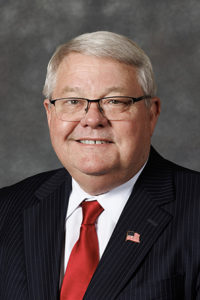Changes to casino, racetrack regulation proposed
The General Affairs Committee heard testimony Jan. 27 on a number of proposed changes to casino and racetrack enclosure regulation in Nebraska.

Bellevue Sen. Rick Holdcroft, chairperson of the committee, said oversight responsibilities for the State Racing and Gaming Commission have “expanded exponentially” since casino gaming was legalized in Nebraska in 2020.
Holdcroft said the changes outlined in LB357, introduced by the committee, would help the commission keep up with that expansion and ensure “operational integrity, transparency and fairness” within the gaming industry.
“It has taken a large effort by the commission to get the now four operating casinos up and running,” he said, “and in that time the commission has expanded by over 30 workers to keep up [with] this fast growth.”
Among other changes, the bill would:
• create a new Racetrack Gaming Fund and consolidate two existing commission cash funds into it;
• reduce the required number of annual commission meetings from eight to six;
• update commission background check and fingerprint procedures;
• clarify licensing fee structures and requirements; and
• provide for an application process for a $10,000 three-year racetrack enclosure license.
Casey Ricketts, executive director of the State Racing and Gaming Commission, testified in support of the proposal. She said the commission currently licenses race days in Nebraska but has no authority under state law to license racetrack enclosures.
Ricketts said having jurisdiction over the physical space in which races are held would help the commission better carry out their oversight duties.
“LB357 was drafted to help the commission be more efficient at regulating horse racing and casino gambling,” she said.
The bill also changes the payment process for an existing one-time authorized gaming operator license, which has a $5 million fee. Under LB357, the license fee still must be paid over a five-year period — with $1 million due at the time an application is issued — but each additional $1 million payment would be required annually until the fee is paid in full.
Ricketts said the current fee structure gives the commission no recourse if a licensee chooses not to pay annually. This potentially could create cash flow issues for the commission, she said, hindering their oversight ability.
No one testified in opposition to the bill and the committee took no immediate action on the proposal.


